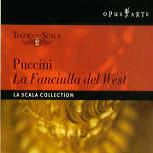Despite one piece of casting that some listeners may find a detriment, this is a marvelous production/performance (from 1991) of Puccini’s impressionistic, fascinatingly scored, under-appreciated saga of America’s Wild West during the gold rush. The super-realistic sets by Stefanos Lazaridis imply a relatively wealthy mining community–the barroom in Act 1 is solid and well-appointed, and Minnie’s simple cabin looks as if it could withstand an avalanche–and overall create the type of atmosphere that fans of American movie westerns will find comfortable and accurate. Similarly, Jonathan Miller’s natural direction has no jarring edges.
Minnie and Johnson, immediately attracted to one another, keep making slightly awkward advances in the lengthy duet that ends the first act, but they never connect. Their “proper” behavior, with its smoldering undertones, makes the second-act kiss just the big deal it should be. And the card game that closes Act 2, shown in close-ups, reveals the tension in the situation. The miners behave like good, Old-West types, although close scrutiny could lead us to believe that there was a fine dry cleaner just around the corner.
Dick Johnson arguably is Puccini’s most difficult tenor role, and Placido Domingo sings it with remarkable security, actually improving as the performance progresses. Aside from a rather nasty high B-natural in Act 1, he seems comfortable with the part’s high tessitura, singing with force and great expressivity. And he looks dashing as a western hero/bandit. Baritone Juan Pons turns in what is perhaps his most dramatically exciting portrayal. In addition to being genuinely menacing, he’s quite moving in his introspective moment early in the opera, and he gets more color than usual out of his rather grainy, dark baritone.
The problem arrives with the Minnie of Mara Zampieri. Although costumed abominably (it’s hard to decide if the buttoned-up look in Act 1 is worse than the flannel nightie in Act 2, although they both take a back seat to the frump-a-thon in the last act), she sings all of the notes (quite a feat in itself) and acts convincingly. But the quality of her voice is a matter of taste: she too often could pass for a poorly played shawm or a desperate boy soprano, and the concentrated, laser-like focus of her sound occasionally feels like the musical equivalent of a dental drill. But that may just be my reaction. The miners and other characters are a fine bunch, with Marco Chingari making the most of the opera’s most beautiful melody–the little homesick song in the first act. Lorin Maazel, perhaps reacting to the score’s shimmering orchestration and harmonies, brings out the best in the work, even in the difficult exposition period at the opera’s start. The 2.0 sound is spotless, as is the picture; there are English subtitles. The accompanying booklet contains a synopsis and Italian-only libretto. If you can stand Zampieri, this is a fine presentation of this wonderful opera.
































